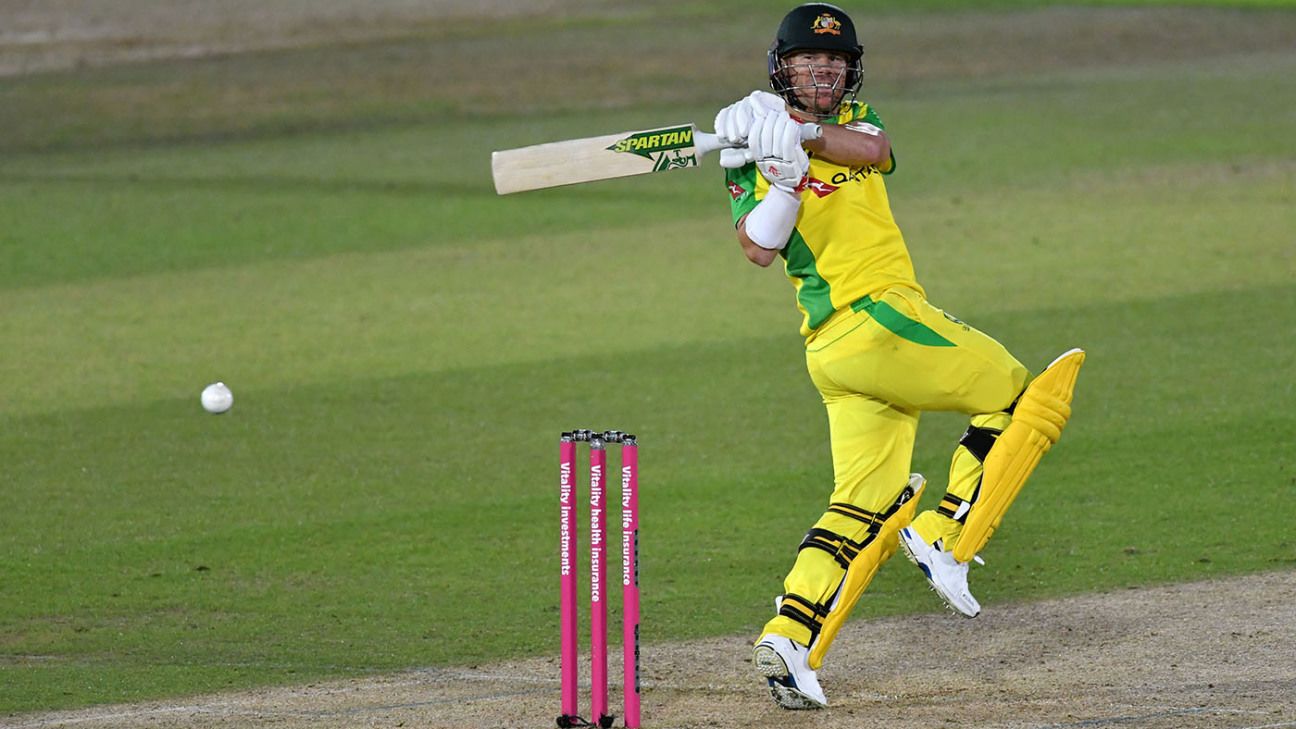
Dilemmas facing cricket administrators in Australia and around the world have been underlined by David Warner's confirmation that he won't take part in the BBL for the remainder of his international career, while also expressing doubts about any player with a family committing to another 12 months of bio-secure bubbles and quarantines in the time of Covid-19.
When the BBL began, Warner was touted as one of its major selling points, but after his international career took off in that same season, he has been entirely absent from the tournament for the past seven years. Rather than prevaricating about the issue, Warner showed welcome frankness in declaring he would not take part in the event so long as he is playing for Australia, instead valuing some rare summer days with his wife Candice and their three children amidst an otherwise unrelenting schedule.
At the same time, Warner expressed the view that new rule changes to the BBL for its 10th season were tinkering at the edges of the main problem for the league, which revolved largely around its inability to get the best players taking part more often.
ALSO READ: Adam Voges - Fourteen-game BBL season 'too long'
"I think the most important thing is if you can get the Australian players and the best international players coming out to play in that, that would probably fix that sort of issue with what they're trying to tinker with the rules," Warner said. "The rules that have come out, I understand the reasoning why they're bringing it out. Do we need to tinker with it? Personally I don't think we do, I think it's just about getting the right people to come out and play, the right access to players to play, the Australian contracted players.
"It's difficult for us players to play all three forms, even if there is a window, you've got to have that break, because you're going full tilt into summer as well, there's no off-season for us. Personally I've got three kids at home and a wife that I owe my time to as well. So playing all three forms that's very difficult to be able to do that, and I don't think I'll play while I'm playing for Australia still - that's honestly speaking.
"Going back to those rules, they've been put in place for a reason to create a bit more engagement. When you lose three wickets in Powerplays, which happened quite significantly the last couple of years, the game's pretty much dead, especially when you're chasing 200. So if you can sort of have that extra Powerplay at the end, that sub, vice versa, it can make a difference - we'll have to wait and see. But first and foremost, I think it's getting the best players to play, and at this present time in the scheduling, it's very difficult to do that."
Australia's senior fast bowler Mitchell Starc has already expressed doubts about the sustainability of the current merry-go-round of quarantine periods and bubbles in which players are confined to hotels without access to family and then the repeat of the cycle for another series. While this summer's arrangements will be somewhat less stringent in Australia due to low Covid-19 case numbers, the prospect of further restrictions related to travel to South Africa, England and the Caribbean in 2021 have left Warner and others asking plenty of questions.
"To answer your question honestly, it's going to be very difficult to be able to do that," Warner said. "This last six months has been quite challenging in itself, getting used to these bubbles and trying to get used to not having the family with me. They're things that each player has different circumstances and even Starcy's a unique one with his wife playing as well. We're just not going to get that time to see our family.
"I wouldn't ever put them in that situation where they have to do 14 days quarantine at home. The next 12 months is very difficult when you look at the calendar, there's going to be definitely times where you can come home and have time with your family, but yet again you've got that 14 days that's in place that you're going to have to do beforehand, so that almost puts it out of the conversation.
"That's going to be something we're going to have to speak to the coaches and selectors about, because each individual's going to have to put their hand up and be brave and say it's going to be very difficult."
In terms of the longer term calendar, Warner said Australia's players have already been speaking for some time about a differing format focus depending on the proximity of World Cups. Therefore, the white-ball squad for the current series against India has something more of a T20 focus given the next T20 World Cups are scheduled for 2021 and 2022, before the next ODI edition of the global event is not until 2023.
"That's something that we have identified as players and coaching staff already," Warner said. "I think you look at our one-day and T20 team, what we are picking is pretty relevant to what we're going to face with the next couple of World Cups. For us it's about if we're going to take time off, it will be between those series. Obviously the preference is playing those World Cups and making sure we're gearing up in the right way to perform in those tournaments."















 Phone: (800) 737. 6040
Phone: (800) 737. 6040 Fax: (800) 825 5558
Fax: (800) 825 5558 Website:
Website:  Email:
Email: 






